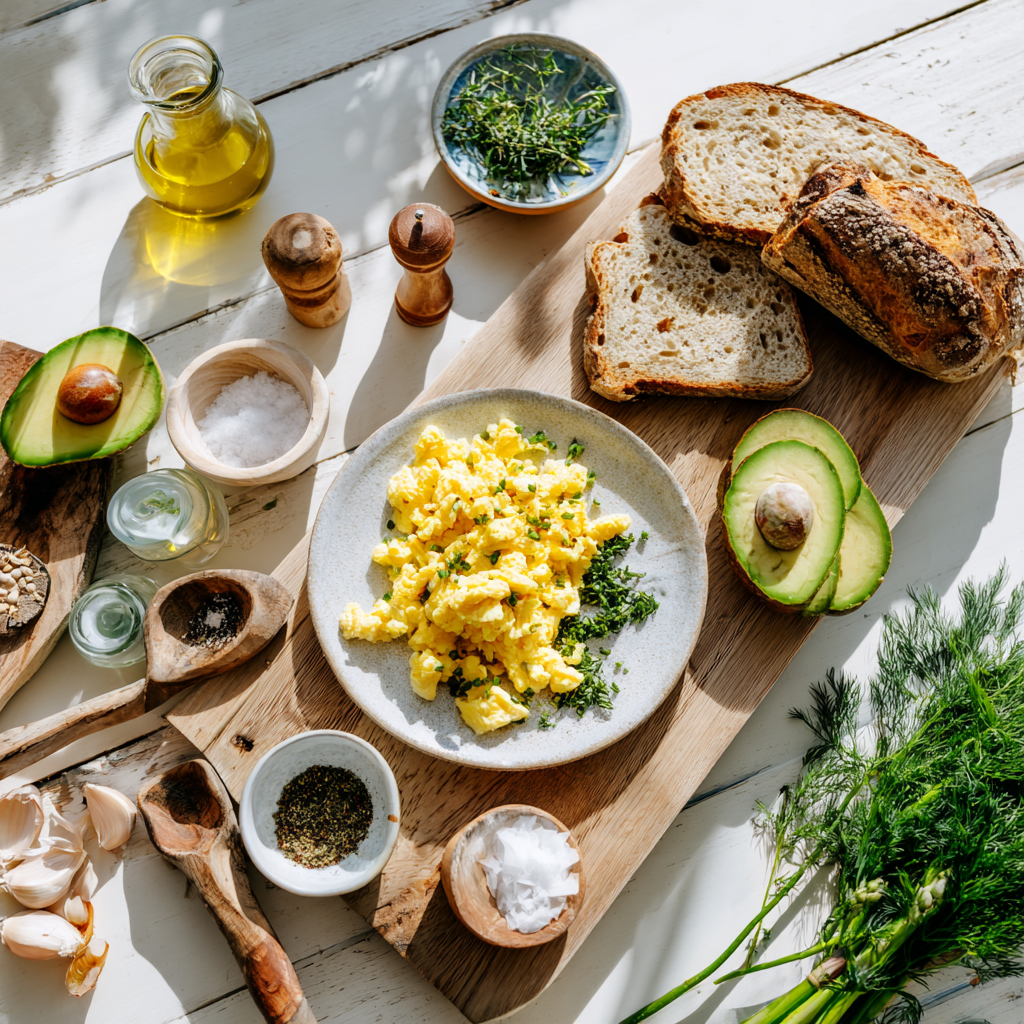
Breakfast Ideas That Work for GERD
I know mornings can be tough when you’re dealing with GERD. Acid reflux makes choosing breakfast stressful. But don’t worry. I’ve been there, and I found ways to enjoy food again.
What is the best breakfast for GERD? Simple meals that are low in fat and acid work wonders. Think oatmeal, yogurt, or a banana smoothie. These foods sit easy on your stomach.
Let me share some tips I use every day:
- Pick low-acid fruits like bananas or melons.
- Choose whole grains such as oatmeal or whole wheat toast.
- Add lean proteins like egg whites or Greek yogurt.
These options help keep acid reflux at bay while still tasting great.
Foods to Avoid in the Morning
Some foods make GERD worse. Here’s what I steer clear of:
- Coffee and tea. Both can trigger reflux.
- Citrus fruits like oranges or grapefruits.
- Fried or greasy foods. They slow digestion.
Avoiding these has made my mornings better. Trust me, it’s worth it.
Are Scrambled Eggs OK for GERD?
Yes, scrambled eggs can work if you prepare them right. I stick to egg whites. They’re lower in fat and easier on my stomach. Here’s how I make them:
- Use only egg whites or mostly whites.
- Cook them in a nonstick pan with no oil.
- Add veggies like spinach or zucchini for flavor.
This keeps the meal light but satisfying. A small change makes a big difference.
Drinks to Start Your Day Right
What to drink first thing in the morning for acid reflux? Water is always safe. It helps wash away acid and kickstarts digestion. Other good choices include:
- Herbal teas like chamomile or ginger.
- Almond milk instead of dairy.
- Coconut water for hydration.
I used to grab orange juice, but switching to herbal tea changed everything. My stomach feels calmer now.
Meal Prep Tips for Busy Mornings
Mornings rush by too fast. Prepping ahead saves time and stress. Here’s what works for me:
- Make overnight oats in jars. Add fruit and nuts before bed.
- Boil eggs the night before for quick protein.
- Freeze smoothie packs with berries and spinach.
Having ready-to-go meals means I never skip breakfast. Skipping meals actually worsens GERD symptoms.
Sample GERD-Friendly Breakfast Menu
Here’s a simple menu I follow most mornings:
| Day | Breakfast Idea |
|---|---|
| Monday | Oatmeal with almond milk and sliced banana. |
| Tuesday | Scrambled egg whites with steamed spinach. |
| Wednesday | Greek yogurt topped with chia seeds and honey. |
| Thursday | Smoothie with frozen mango, spinach, and coconut water. |
| Friday | Whole grain toast with avocado spread lightly. |
Variety keeps things interesting. Plus, all these meals are gentle on my stomach.
Listen to Your Body
Everyone’s GERD triggers differ. What works for me might not work for you. Pay attention to how your body reacts. Keep a food diary if needed. Track what you eat and note any symptoms.
For example, I learned tomatoes upset my stomach. Removing them helped. Small changes add up over time.
Why Breakfast Matters for GERD
Skipping breakfast isn’t an option. An empty stomach increases acid production. This leads to more reflux later in the day. Eating a balanced meal sets the tone for the rest of the day.
Focus on nutrient-rich foods. Lean proteins, healthy fats, and fiber keep energy levels steady. These also reduce the risk of flare-ups.
Final Thoughts Before Moving On
Eating with GERD doesn’t mean bland or boring food. With a little planning, you can enjoy tasty meals that won’t upset your stomach. Stick to low-acid, low-fat options, and prep ahead when possible.
Next, we’ll explore lunch ideas that continue supporting digestive health. Stay tuned!

What to Eat for Breakfast When Managing GERD
Let me tell you, mornings can be tricky when you’re dealing with GERD. You wake up, maybe feeling a little groggy, and all you want is something comforting to kickstart your day. But here’s the thing—what feels good in the moment might not feel so great an hour later. That’s why I always recommend starting your day with breakfast recipes for GERD that are gentle on your stomach but still satisfying.
By the way, I used to think scrambled eggs were my go-to breakfast, especially on busy weekdays. Funny enough, after a bit of trial and error (and some uncomfortable reflux episodes), I realized they weren’t doing me any favors. Scrambled eggs might seem harmless, but they can be high in fat depending on how you cook them, which can trigger acid reflux. If you’re wondering, “Are scrambled eggs OK for GERD?”, the answer is… it depends. Stick to egg whites or use minimal oil if you can’t resist them.
Instead of eggs, I started experimenting with plant-based options. One of my favorites? Alkaline vegan breakfast recipes like overnight oats or chia pudding. These dishes are packed with fiber and nutrients, which help balance your body’s pH levels. Plus, they’re super easy to prep ahead of time. If you’re curious about more ideas, check out these alkaline vegan breakfast recipes that have saved many of my mornings.
Here’s another tip: don’t skip breakfast thinking it’ll save you from reflux. Skipping meals can actually make things worse by slowing down digestion. Instead, aim for small portions spread out over time. For instance, try having half an avocado on whole-grain toast with a sprinkle of sea salt. Avocados are rich in healthy fats and low in acidity, making them perfect for healthy alkaline breakfast recipes.
Drink Smart in the Morning
Now, let’s talk drinks because hydration plays a huge role in managing GERD. Ever wondered, “What to drink first thing in the morning for acid reflux?” Well, water is always a winner—it flushes out toxins and keeps your digestive system running smoothly. But honestly, plain water gets boring sometimes, doesn’t it?
That’s where herbal teas come in handy. Chamomile or ginger tea, for example, can soothe your stomach while adding variety to your routine. Just steer clear of citrus juices like orange or grapefruit—they’re highly acidic and likely to cause flare-ups. Speaking of drinks, coffee lovers, I hate to break it to ya, but caffeine isn’t exactly your friend here either. It relaxes the lower esophageal sphincter, allowing acid to creep back up. Ouch!
On days when I crave something warm and cozy, I whip up a turmeric latte made with almond milk. Turmeric has anti-inflammatory properties that work wonders for gut health. And guess what? There are tons of alkaline foods recipes for breakfast that incorporate turmeric as a star ingredient. Give it a shot—you might just fall in love!
Quick and Easy GERD-Friendly Breakfast Ideas
If you’re short on time, don’t worry—I’ve got you covered. Here’s a quick list of simple yet effective breakfast recipes for GERD:
- Banana Smoothie: Blend a banana, spinach, almond milk, and a scoop of protein powder for a nutrient-packed drink.
- Oatmeal Bowl: Top rolled oats with sliced almonds, flaxseeds, and a drizzle of honey. Avoid sugary toppings like dried fruits.
- Veggie Wrap: Fill a whole-grain tortilla with hummus, cucumber slices, and shredded carrots.
- Quinoa Porridge: Cook quinoa with almond milk and top with fresh berries. Quinoa is a complete protein and incredibly alkaline-friendly.
Funny story—I once tried making quinoa porridge without knowing much about it, and oh boy, did I mess it up! Turns out, rinsing the quinoa beforehand makes all the difference. Lesson learned: never skip prep steps, even if you’re rushing.
Why Alkaline Foods Matter
You’ve probably heard about alkaline diets, right? They focus on foods that reduce acidity in your body, which is ideal for those dealing with GERD. Incorporating more alkaline ingredients into your meals can make a noticeable difference in how you feel throughout the day. Think leafy greens, nuts, seeds, and root vegetables.
For example, sweet potatoes are one of my staples. They’re filling, versatile, and incredibly alkaline. Roast them with olive oil and herbs, or mash them as a side dish. Need inspiration? Check out these alkaline breakfast recipes that highlight sweet potatoes alongside other gut-friendly ingredients.
Oh, and here’s a random thought: ever noticed how stress affects your digestion? Yep, it’s true. Even the best breakfast recipes for GERD won’t work their magic if you’re stressed out. So take a deep breath before eating, savor each bite, and give yourself permission to slow down. Your body will thank you.
Common Mistakes to Avoid
I’ll admit, I’ve made my fair share of mistakes when figuring out what works for GERD. One big no-no? Eating too quickly. Gulping down food forces your stomach to work overtime, increasing the risk of reflux. Another mistake is pairing acidic fruits like oranges or pineapples with already-acidic foods. Trust me, it’s a recipe for disaster.
Instead, focus on combining alkaline and neutral foods. For instance, pair steamed broccoli with brown rice or enjoy a handful of raw almonds with a green smoothie. These combos keep your meal balanced and easy to digest. And hey, remember that moderation is key. Even “safe” foods can become problematic if eaten excessively.
In conclusion (oops, I said it!), finding the right breakfast recipes for GERD takes patience and experimentation. But once you discover what works for you, mornings become less daunting and more enjoyable. Keep exploring, stay open to trying new things, and most importantly, listen to your body. It knows best!

Additional Tips to Make Breakfast for GERD Easier and More Enjoyable
You know what I realized the other day? Prepping breakfast when you’re dealing with GERD can feel like walking a tightrope. One wrong step, and boom—you’re paying for it later. But here’s the thing: it doesn’t have to be stressful. With a few extra tricks up your sleeve, you can not only avoid flare-ups but also actually enjoy your mornings again. Funny enough, some of these tips might even make your breakfast routine simpler than ever.
Let me start by saying that meal prep is your best friend. When I was first figuring out breakfast recipes for GERD, I spent way too many mornings scrambling to find something safe to eat. Now, I dedicate a little time on Sunday evenings to prep ingredients—like chopping veggies or portioning out oatmeal—and suddenly, mornings feel less chaotic. If you’re someone who’s always rushing out the door, this small habit could seriously save you.
By the way, don’t underestimate the power of spices either! While certain foods are off-limits, there’s no reason your meals should taste bland. Fresh herbs like basil, parsley, and cilantro add tons of flavor without aggravating acid reflux. Just steer clear of anything too spicy or acidic (looking at you, chili powder). Oh, and cinnamon? It’s a total game-changer for oatmeal or yogurt bowls. Trust me, a sprinkle of cinnamon makes everything feel cozier.
What About Those Sneaky Triggers?
Here’s a fun fact: sometimes, GERD triggers aren’t as obvious as coffee or orange juice. For instance, did you know that even healthy fats like avocado can cause issues if eaten in large amounts? I learned this the hard way after overdosing on guacamole toast one morning. Lesson learned: moderation is key. The same goes for nuts and seeds—they’re great sources of protein but can irritate sensitive stomachs if you go overboard.
- Keep portions small: Eating smaller meals helps prevent pressure on your stomach, reducing the risk of reflux.
- Drink wisely: Stick to soothing beverages like herbal teas or warm water with lemon instead of citrus juices or carbonated drinks.
- Avoid lying down: Give yourself at least two hours after eating before lounging or exercising—it makes a world of difference.
I also want to mention something super important: hydration. People often overlook how much their choice of morning drink impacts GERD symptoms. Sure, we all love a hot cup of coffee, but maybe swap it for a caffeine-free alternative. Personally, I’ve fallen in love with ginger tea—it’s calming and has natural anti-inflammatory properties. And yes, drinking plain water first thing in the morning is a solid move too.
How to Turn Breakfast into a Ritual
Alright, let’s talk about turning breakfast from a chore into a ritual. Because honestly, life’s too short to rush through meals, especially ones designed to set the tone for your day. A while back, I started setting aside ten minutes each morning just to sit and savor my food. No phone, no distractions—just me and my plate. Sounds simple, right? But wow, did it change how I approached mealtime.
If you’re struggling to find joy in your breakfast options, try experimenting with presentation. I’m serious! Adding colorful fruits like blueberries or sliced bananas to your oatmeal isn’t just visually appealing; it boosts nutrition too. Or maybe invest in some cute dishes—there’s something oddly satisfying about eating from a pretty bowl. Little things like these can make a big difference in how you perceive your meals.
And hey, why not involve the family? Cooking together can turn breakfast prep into quality bonding time. My niece loves helping me assemble overnight oats jars. She gets to pick her favorite toppings, and I get to sneak in some fiber-rich chia seeds. Win-win!
Actionable Takeaways to Keep Your Mornings GERD-Friendly
Before we wrap this up, let me leave you with a quick checklist of actionable tips. These are the strategies I swear by to keep my mornings both delicious and reflux-free:
- Stick to low-acid fruits: Bananas, melons, and apples are excellent choices.
- Choose lean proteins: Scrambled eggs made with minimal oil or Greek yogurt are perfect.
- Incorporate whole grains: Oatmeal, quinoa, or whole-grain toast provide steady energy without triggering symptoms.
- Listen to your body: Everyone’s triggers are different, so pay attention to what works for you.
- Stay consistent: Regular meal times help regulate digestion and reduce flare-ups.
Oh, and one last note—don’t forget to check out our full collection of breakfast recipes for GERD for more inspiration. Whether you’re craving sweet or savory, we’ve got ideas to suit every palate.
Final Thoughts
Living with GERD doesn’t mean giving up on tasty, satisfying breakfasts. With a bit of planning, creativity, and mindfulness, you can transform your mornings into something you look forward to. Remember, it’s not just about avoiding discomfort—it’s about creating habits that nourish both your body and soul. So grab that apron, experiment with new flavors, and take back control of your mornings. You’ve got this!
Frequently Asked Questions
What is the best breakfast for GERD?
The best breakfast for GERD includes foods that are gentle on the stomach, such as oatmeal topped with banana slices, scrambled eggs cooked with minimal oil, or plain Greek yogurt with honey. Avoid high-fat, acidic, or spicy ingredients to minimize symptoms.
What foods are good for acid reflux in the morning?
Foods like bananas, melons, oatmeal, and whole-grain bread are excellent for managing acid reflux in the morning. They’re low in acidity and easy to digest, making them ideal for sensitive stomachs.
Are scrambled eggs OK for GERD?
Yes, scrambled eggs are generally fine for GERD, provided they’re prepared with minimal butter or oil. Overcooking or adding heavy cream might increase fat content, which could trigger symptoms, so keep it light and simple.
What to drink first thing in the morning for acid reflux?
Warm water with a splash of lemon, herbal teas like chamomile or ginger, and plain almond milk are great options. Avoid citrus juices, coffee, and carbonated beverages, as they can worsen reflux symptoms.
Can I eat toast with GERD?
Absolutely! Opt for whole-grain toast rather than white bread, and pair it with non-acidic spreads like almond butter or mashed avocado (in moderation). Toast is a versatile base for many GERD-friendly toppings.
Is peanut butter safe for GERD?
Peanut butter is usually okay in small amounts, but its high-fat content can be problematic for some people. If you notice discomfort, try switching to lower-fat alternatives like sunflower seed butter.
Should I skip breakfast if I have GERD?
No, skipping breakfast isn’t recommended. Doing so can lead to overeating later in the day, which may worsen reflux symptoms. Instead, focus on light, balanced meals to start your day off right.
Are smoothies good for GERD?
Smoothies can work if made with GERD-friendly ingredients like spinach, cucumber, almond milk, and banana. However, avoid acidic fruits like oranges or pineapples, as well as dairy-based yogurts, which might irritate your stomach.
What snacks can I eat for GERD?
Snack on low-acid fruits like apples or pears, rice cakes with hummus, or plain popcorn. Nuts and seeds are okay in moderation, but watch portion sizes to avoid triggering symptoms.
How can I make my breakfast routine easier?
Meal prepping is a lifesaver. Prepare ingredients ahead of time, like soaking oats overnight or chopping veggies for omelets. This way, you’ll spend less time stressing and more time enjoying your mornings.

Breakfast Recipes for GERD
Ingredients
Equipment
Method
- Make oatmeal with almond milk and top with sliced banana.
- Scramble egg whites in a nonstick pan with steamed spinach.
- Prepare Greek yogurt with chia seeds and honey.
- Blend frozen mango with spinach and coconut water for a smoothie.
- Spread avocado on whole grain toast lightly.
